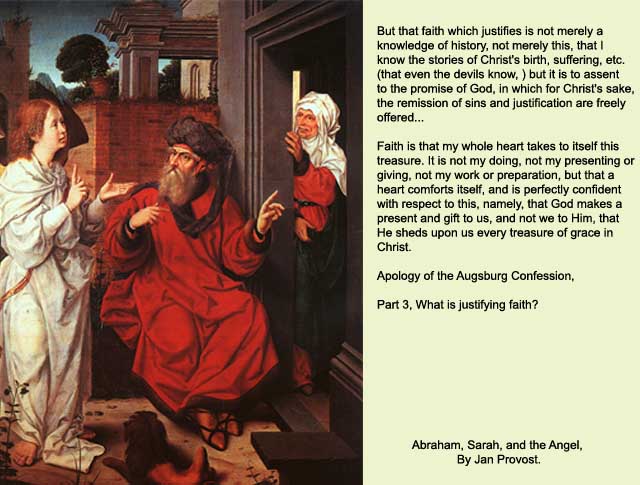First, I want to express my appreciation for all those who have attacked justification by faith. They make this work fascinating. In the distant past, I would read the Augsburg Confession or the Apology and think, "Yes, this is perfectly clear." Anyone can read those plain but elegant statements and know exactly what they mean. The Augsburg Confession is concise while the Apology or Defense of the Augsburg Confession is more elaborate in its explanations. Breaking the Apology up into illustrated paragraphs makes it even easier to follow and to admire.
Second, the Apology reminds me of those often heard expressions of awe about ancient stone monuments. "The stones were so closely fitted together that no one can get a dime between them." Ancient technology was so advanced that current egg-heads cannot explain how the monuments were built, not to mention the precision of their design, the perfection of their execution. Slave labor is a convenient explanation, except Hitler's captive labor during WWII built a lot of duds, as an expression their devotion to their master.
How can anyone get a foothold for Universal Objective Objective Justification in the Apology of the Augsburg Confession? Walther's sects are in dilemma, because they profess loyalty to the Book of Concord. Melanchthon wrote the Augsburg and the Apology. Luther and the Concordists identified themselves as "theologians of the Augsburg Confession."
WELS, Missouri, and the Little Sect on the Prairie must repudiate the Book of Concord or their precious OUJ. One supplants the other, just as nitrogen supplants oxygen.
The honest answer is plain. The Book of Concord is nothing more than a rabbit's foot for the SynConference, as evidenced by their massive, expensive, and self-destructive venture into Church Growthism, their fellowship with ELCA and pan-religious ecumenism.
When a member asked Pastor Jenswold about teaching a class on the Book of Concord, he replied that the Confessions were "boring and irrelevant." WELS SP Mark Schroeder, who said his sect is getting more confessional, selected Jenswold for the Synodical Council - a big deal for one of the smallest Lutheran groups in the world. Others have had similar reactions when asking a pastor to teach the Confessions.
 |
| Romans 4 is devoted to Abraham being justified by faith. How ignorant can someone be to turn that chapter into a Halleluia for forgiveness without faith? |
http://ichabodthegloryhasdeparted.blogspot.com/2012/06/justification-by-faith-in-apology.html
---
Brett Meyer has left a new comment on your post "Ancient Stone Monuments and the Apology of the Aug...":
(W)ELS UOJ District President Pastor Jon Buchholz had this to say in June:
As members of the Wisconsin Evangelical Lutheran Synod (WELS), we treasure the unity we share as members of one church body, walking together in doctrine and practice. Our confessional and practical unity is something that is very precious to us.
Our unity centers in our connection to Jesus Christ, our one Savior. We are united by complete agreement in our teaching. We are united in God’s Word and in complete agreement with everything it says. We hold unswervingly to God’s teaching in the Holy Bible as the only reliable, unchanging source of truth. We do not wish to depart one iota from what God says.
http://www.elctempe.org/home/180001623/180001623/images/2012-06%20June.pdf
This sounds like the opening statements of a commencement ceremony where Jeff Gunn's emergent church is officially acknowledged to be a member in perfect doctrinal and practicing unity with the (W)ELS.
Buccholz crowing three times about not departing one iota from what God's Word says reminds me of four quotes from his epic 2005 WELS Convention essay on Justification:
”In each example, the mark of heresy is to go as far as Scripture goes—and then to go one step further.” P. 7
"God has forgiven the whole world. God has forgiven everyone his sins." This statement is absolutely true! This is the heart of the gospel, and it must be preached and taught as the foundation of our faith. But here’s where the caveat comes in: In Scripture, the word "forgive" is used almost exclusively in a personal, not a universal sense. The Bible doesn’t make the statement, "God has forgiven the world."
"God has forgiven all sins, but the unbeliever rejects God’s forgiveness." Again, this statement is true—and Luther employed similar terminology to press the point of Christ’s completed work of salvation.16 But we must also recognize that Scripture doesn’t speak this way."
"God has declared the entire world righteous." This statement is true, as we understand it to mean that God has rendered a verdict of "not-guilty" toward the entire world. It is also true—and must be taught—that the righteousness of Christ now stands in place of the world’s sin; this is the whole point of what Jesus did for us at Calvary. However, once again we’re wresting a term out of its usual context. In Scripture the term "righteous" usually refers to believers. "
http://www.wlsessays.net/files/BuchholzJustification.pdf

